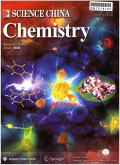- 钛学术文献服务平台 \
- 学术期刊 \
- 基础科学期刊 \
- 自然科学总论期刊 \
- 中国科学:化学(英文版)期刊 \
null
Influence of chelate ring size on the properties of phosphine-sulfonate palladium catalysts
基本信息来源于合作网站,原文需代理用户跳转至来源网站获取
摘要:
Phosphine-sulfonate based palladium is one of the most extensively studied catalyst systems in olefin polymerization.This type of catalyst features six-membered chelate ring size,and can enable the copolymerizations of ethylene with a wide variety of polar monomers.In this contribution,we decide to investigate the influence of chelate ring size on the properties of phosphine-sulfonate palladium catalysts.As such,a series of phosphine-sulfonate ligands and the corresponding seven-membered ring Pd (II) complexes [κ2-(P,O)-2-(CH2-PR1R2)-4-methylphenyl-sulfonato]Pd(Me) (DMSO) (Pd1,R1=R2=Cy,Pd2,R1=R2=o-MeO-C6H4;Pd3,R1=Ph,R2=2-[2,6-(MeO)2C6H3]C6H4;DMSO=dimethyl sulfoxide) were designed,prepared and characterized.These palladium complexes are moderately active when they were applied in ethylene polymerization and copolymerizations with methyl acrylate and butyl vinyl ether.However,their properties are greatly reduced from those of the classic six-membered ring phosphine-sulfonate palladium complex Pd2'.The experimental results indicate that the bigger chelate ring size can increase the ligand flexibility and damage the catalytic properties for the phosphine-sulfonate type palladium catalysts.

推荐文章
期刊_丙丁烷TDLAS测量系统的吸收峰自动检测
带间级联激光器
调谐半导体激光吸收光谱
雾剂检漏 中红外吸收峰 洛伦兹光谱线型
不同盐度、温度及光照对漂浮浒苔生理生态的影响
浒苔
盐度
温度
光照
生理生态
期刊_联合空间信息的改进低秩稀疏矩阵分解的高光谱异常目标检测
高光谱图像
异常目标检测 低秩稀疏矩阵分解 稀疏矩阵 残差矩阵
内容分析
关键词云
关键词热度
相关文献总数
(/次)
(/年)
文献信息
| 篇名 | Influence of chelate ring size on the properties of phosphine-sulfonate palladium catalysts | ||
| 来源期刊 | 中国科学:化学(英文版) | 学科 | |
| 关键词 | |||
| 年,卷(期) | 2018,(9) | 所属期刊栏目 | |
| 研究方向 | 页码范围 | 1175-1178 | |
| 页数 | 4页 | 分类号 | |
| 字数 | 语种 | 英文 | |
| DOI | |||
五维指标
引文网络
引文网络
二级参考文献 (0)
共引文献 (0)
参考文献 (4)
节点文献
引证文献 (0)
同被引文献 (0)
二级引证文献 (0)
2009(1)
- 参考文献(1)
- 二级参考文献(0)
2011(1)
- 参考文献(1)
- 二级参考文献(0)
2015(1)
- 参考文献(1)
- 二级参考文献(0)
2017(1)
- 参考文献(1)
- 二级参考文献(0)
2018(0)
- 参考文献(0)
- 二级参考文献(0)
- 引证文献(0)
- 二级引证文献(0)
引文网络交叉学科
相关学者/机构
期刊影响力
中国科学:化学(英文版)
主办单位:
中国科学院
出版周期:
月刊
ISSN:
1674-7291
CN:
11-5839/O6
开本:
16开
出版地:
北京东黄城根北街16号
邮发代号:
创刊时间:
1950
语种:
eng
出版文献量(篇)
4060
总下载数(次)
0
总被引数(次)
11421
期刊文献
相关文献
推荐文献
- 期刊分类
- 期刊(年)
- 期刊(期)
- 期刊推荐
力学
化学
地球物理学
地质学
基础科学综合
大学学报
天文学
天文学、地球科学
数学
气象学
海洋学
物理学
生物学
生物科学
自然地理学和测绘学
自然科学总论
自然科学理论与方法
资源科学
非线性科学与系统科学
中国科学:化学(英文版)2022
中国科学:化学(英文版)2021
中国科学:化学(英文版)2020
中国科学:化学(英文版)2019
中国科学:化学(英文版)2018
中国科学:化学(英文版)2017
中国科学:化学(英文版)2016
中国科学:化学(英文版)2015
中国科学:化学(英文版)2014
中国科学:化学(英文版)2013
中国科学:化学(英文版)2012
中国科学:化学(英文版)2011
中国科学:化学(英文版)2010
中国科学:化学(英文版)2009
中国科学:化学(英文版)2008
中国科学:化学(英文版)2007
中国科学:化学(英文版)2006
中国科学:化学(英文版)2005
中国科学:化学(英文版)2004
中国科学:化学(英文版)2003
中国科学:化学(英文版)2002
中国科学:化学(英文版)2001
中国科学:化学(英文版)2000
中国科学:化学(英文版)2018年第9期
中国科学:化学(英文版)2018年第8期
中国科学:化学(英文版)2018年第7期
中国科学:化学(英文版)2018年第6期
中国科学:化学(英文版)2018年第5期
中国科学:化学(英文版)2018年第4期
中国科学:化学(英文版)2018年第3期
中国科学:化学(英文版)2018年第2期
中国科学:化学(英文版)2018年第12期
中国科学:化学(英文版)2018年第11期
中国科学:化学(英文版)2018年第10期
中国科学:化学(英文版)2018年第1期

 免费查重
免费查重










